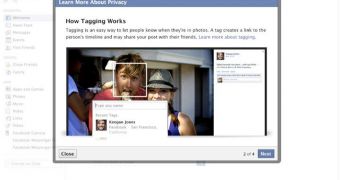Facebook is making some changes to the signup process to make it easier for new users to get information regarding Facebook settings and features, specifically privacy settings. The idea is to make sure people make informed decisions as soon as they signed up.
The site didn't come up with this idea all by itself, all the pressure from privacy regulators influenced this decision, obviously, but it's a good move nonetheless.
The only problem is that this only applies to new users and, at one billion active users every month and a lot more registered users, there aren't that many people out there left to sign up for the site.
"We’re pleased to be rolling out more prominent and detailed educational privacy information to new users as soon as they begin the process of signing up for Facebook. These updates to our sign-up process will be visible to most new users around the globe starting today," Facebook explained.
For one, there are now privacy tips and explanations throughout the three stop signup process.
Info such as the fact that any contacts you sync from other services are going to be stored for the future, or whether things like profile data and photos are public or not, is provided up front.
As soon as you finish the process, you get an invitation to a privacy tour. In it, all the basics are covered, like who gets to see what you post, who can tag you in photos and what that means, and how app permissions work.
There were also a few changes to the way Facebook works, more prominent controls to make it easier to choose who you share certain information with.
"We’ve also added in-line privacy controls to the new user experience so that people can select an audience for their High School, College/University, and Employer as they sign up for Facebook," Facebook added.
Overall, the changes are very welcomed. While there is bound to be more that Facebook can do, this is probably what should have been the default from the get go.

 14 DAY TRIAL //
14 DAY TRIAL //